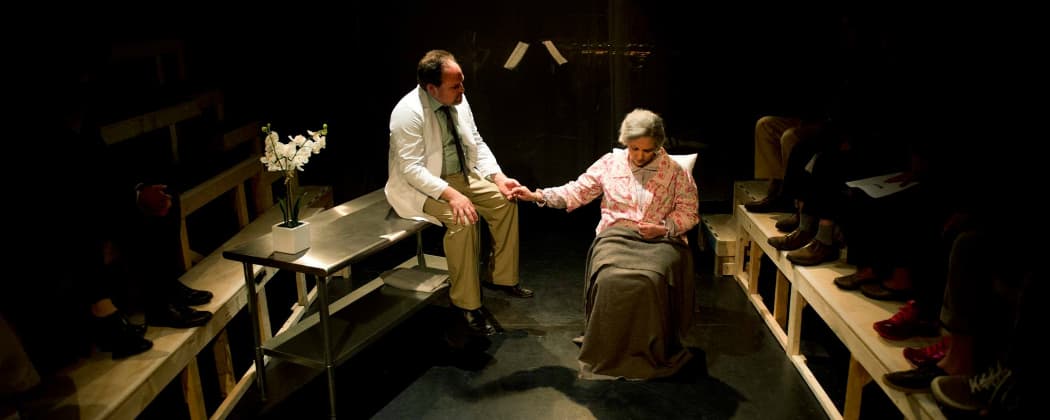Advertisement
World Premiere Of Hannah Lash's 'Beowulf' Presents A Flawed, Emotional Hero

Think of a hero — a modern hero. Someone whose selfless actions have remained unblemished by time, whose positive reputation persists without stain.
It’s not easy. Contemporary heroes usually stay in the spotlight long enough to be poked and reduced to ordinary humanity. We no longer have a taste for the unabashedly noble, spotless personality.
Hannah Lash’s chamber opera “Beowulf,” premiered May 20 by the relentlessly inventive Guerilla Opera in Boston Conservatory’s Zack Box Theater, invokes a hero from the pre-modern world. There’s nothing ambiguous about the ancient hero Beowulf, who strode into Hrothgar’s hall, slayed the monster Grendel and then Grendel’s mother and later killed a dragon as well in his final, fatal battle.
But Lash’s opera brings us no unambiguous hero — just a doctor named Beowulf, suffering from post-traumatic stress disorder memories, charged with caring for a deteriorating, challenging mother in her last days.
Updating classical texts can be as direct as changing costumes or sets to move the action into the modern day. With Lash’s “Beowulf,” just invoking the epic with a character’s name brings our contemporary notions of a hero’s action into relief. Lash makes no further attempt to bring the epical Beowulf story to life. This is a contemporary tale, yoked to the past with one simple word — a name.
It’s an inspired authorial stroke. Staged with a set of sparse discomfort, the Guerilla instrumentalists and singers bring an appropriate sensibility to Lash’s colloquial libretto and lush, intense score. Baritone Brian Church sings the title role, and soprano Aliana de la Guardia sings the Mother. Tenor Brendan P. Buckley sings the only other role, a Nurse.
The set design (Julia Noulin-Mérat) aids greatly in getting at the heart of the uncomplicated dialogue. Audience members sit above the stage floor on bench risers as if watching a surgical theater down below. Onstage, an antiseptic steel table serves variously as a bed, couch or operating area. A matching steel chair fills out the set.
Director Andrew Eggert makes the acting and blocking likewise uncomplicated, complementing the directness of the story. Beowulf is home now, but plagued by vivid memories of battle, in particular losing a child (Eve) in the conflict. The child was so hopelessly wounded that he had to put her to rest with a morphine overdose.
But comfort at home is hard to find. His mother, her mental state a spiraling downward paranoia, is finally removed from the nursing facility. Brought to Beowulf’s home to die, she too will be euthanized by our hero, with morphine.
The libretto gets interpreted largely through recitative. The sole aria, a touching lullaby (“Good night, my star”), gets repeated, beginning as a soprano solo and then morphing into a duet, at the apex of the drama, and then again at the conclusion.
Contrasted with the simple vocal lines, the instrumental score is layered with counterpoint and evocative textures. A modest quartet interprets the score, visible behind a scrim: percussion (Mike Williams), violin (Lilit Hartunian), saxophones (Philipp A. Stäudlin) and clarinets (Amy Advocat). Lash makes the most of these forces, especially in the rich percussion part, deeply indebted to Williams’ skills.
The vocal score suffers at the outset from repetitive, short phrases, and seems to stay around the same key far too long. But drama is subtly and effectively ensured during the focused second scene, when Beowulf, visiting his mother at the nursing facility, finds her mental state permanently rocked by her surroundings and by the incompetent nurse. As the singers engage in more developed vocal lines, the subtleties of the story become more real.
From that point, bringing her home, and presiding over her final moments, are Beowulf’s only options. He might be heroic, or he might just be following the path of his diminished choices. The singing, increasingly engaged duets and solo excursions, illuminates the modern monsters this Beowulf must confront.
Guerilla Opera’s “Beowulf” runs May 20-22 and 27-28 in the Zack Box Theater at Boston Conservatory. For information on tickets and showtimes, visit the Boston Conservatory’s website.


